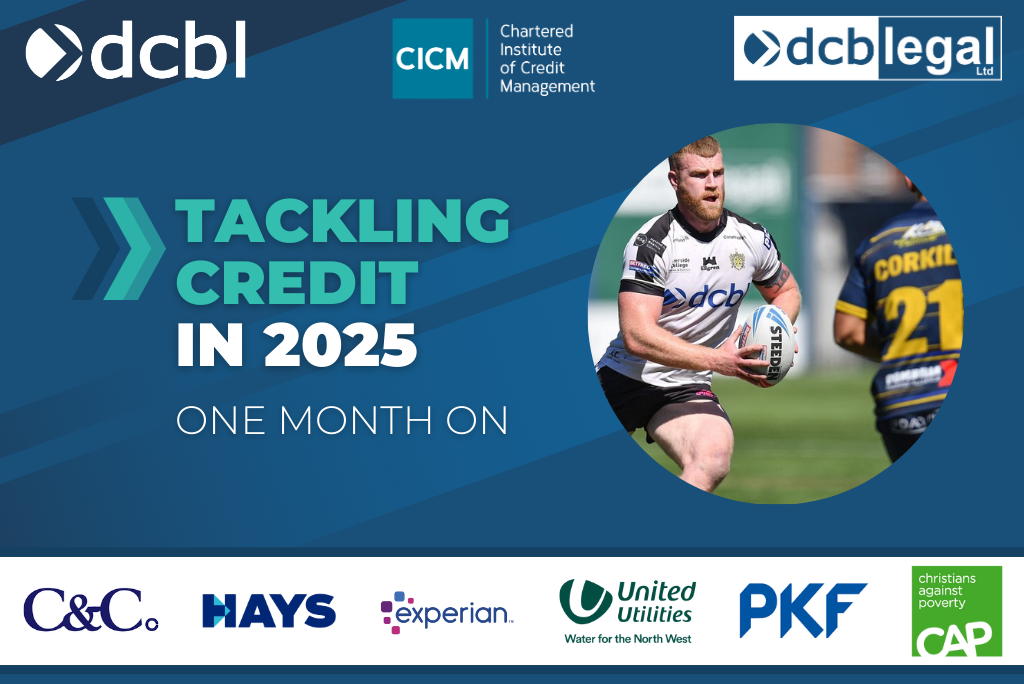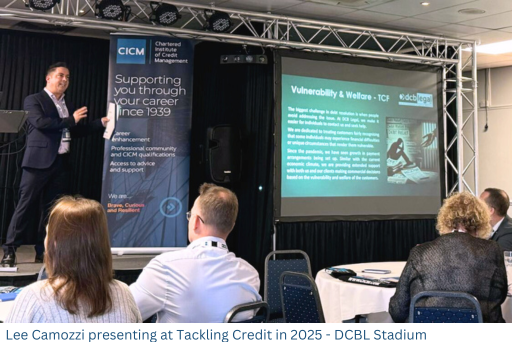
Tackling Credit in 2025: Debt Resolution
22nd November 2024
Personal finances are being squeezed across the country. Every UK household has an average debt of around £65,000 in 2024 – with £1.8 billion owed overall. More broadly, the economy has grown a meagre 0.1% in recent months, with unemployment rising, pay slowing, and the cost of living crisis continuing to pile on the pressure people and businesses.
In such a challenging landscape, how does the debt resolution sector approach tackling credit in 2025? And what’s the upshot of such a turbulent economic period?
On 22nd October 2024, the DCBL Stadium in Widnes played host to Tackling Credit 2025 – A Chartered Institute of Credit Management event that shed light on the answers to these questions.
Both DCBL’s Group Strategy Director Lee Camozzi and High Court Enforcement Officer Tom Ennis led talks on the day, discussing litigation in the data-driven era, and how the economy is shaping up to shift things for credit and debt collection.
Here are some of the key takeaways from the day.
Understanding the humans behind the figures
The climbing debt figures in the UK have mobilised creditors – many of whom are leaning heavily on debt resolution firms to retrieve owed money to maintain a healthy cashflow.
DCBL has spent decades building a reputation for quickly recouping debts, but we have also dedicated time to recognising that a human being lies behind every debt.
Many in the current climate are simply unable to pay on time – creating a vicious cycle where they are penalised with late fees and/or interest to the point where they are saddled with huge financial burdens.
Since the pandemic, we have seen growth in payment arrangements and our goal as a debt resolution firm is to create a supportive environment where individuals feel empowered to seek help without hesitation, leading to better outcomes for everyone. Flexibility is key here – and by offering a variety of platforms for communication, anyone can easily reach out to us for support, via email, WhatsApp, phone or text.
We are also seeing the finance sector at large addressing the human element of debt resolution – namely via the establishment of a brand new moderator in the Enforcement Conduct Board (ECB).
Launching officially in January 2025, this independent body is designed to ensure everyone who experiences enforcement is treated fairly. The ECB has worked closely with stakeholders to develop current guidelines and standards for how enforcement officers should conduct their duties, as well as providing a platform for the public to raise concerns or complaints.
This body will play a crucial role in the future of debt resolution, protecting both the rights of individuals and the integrity of the enforcement sector.
Data and digitalisation
The smart use of data and digitalisation is key to successful debt resolution in 2025.
At DCBL, we utilise AI-Powered Searching – improving our tracing accuracy and making it easier to locate individuals in a shorter amount of time with fewer resources.
This technology is proving instrumental and effective in reclaiming owed monies, but we have also found one of the best solutions of all is to work closely with the debtors themselves.
In some cases, imposing additional financial penalties on individuals already facing significant hardship is unethical. So, we use information returned from the Credit Reference Agencies to populate our Vulnerability Scoring – which is then used to prevent the accumulation of legal costs.
The future of credit management
The enforcement sector is always evolving, and the future of High Court enforcement is likely to be shaped by a combination of legal reforms, technological advancements, economic conditions, and social attitudes.
Moving ahead, we will also see increased digitisation of court processes and online dispute resolution. This will help to streamline processes – which is crucial in a changing political arena.
With a new government in power, we may see a varying approach to welfare policies – which can influence the enforcement landscape. Policies that affect the availability of social safety nets or housing rights, for example, directly impact the volume and nature of enforcement actions.
The future of high court enforcement will likely involve a balance between the need for effective debt recovery and the demand or fair, transparent, and compassionate practices. Technological innovation, legal reforms, and societal attitudes will continue to play a significant role in shaping the future of the industry – and we are hoping to play our own part in continuing to enrich and improve the sector. Our commitment to tackling credit in 2025, with investment in our people, processes, and technology, will play a key part in leading the sector to prioritise ethical debt resolution.

DCBL Stadium: Tackling Credit in 2025






